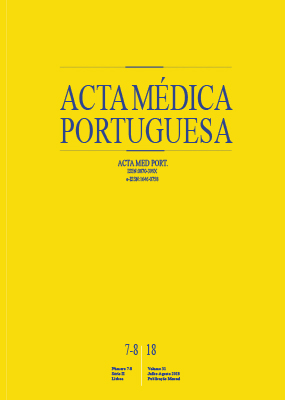Does Aortic Valve Replacement Surgery Improve Patients’ Quality of Life?
DOI:
https://doi.org/10.20344/amp.10241Keywords:
Aortic Valve/surgery, Heart Valve Prosthesis Implantation, Quality of Life, Surveys and QuestionnairesAbstract
Introduction: Aortic valve replacement surgery is done to increase patients’ life expectancy and improve their health-related quality of life. Several published studies have found improvement in health-related quality of life after this procedure, but none have involved patients in Portugal. This study sought to evaluate patients’ health-related quality of life after the implantation of aortic prostheses and compare these values with preoperative health-related quality of life and the general Portuguese population’s health-related quality of life.
Material and Methods: A retrospective study was done with elective patients who underwent implantation of an aortic prosthesis between August 2011 and April 2016. Health-related quality of life was evaluated using the Short Form 36 Health Survey and Short Form 6 Health Survey questionnaires in the preoperative period and 3, 6 and 12 months post-surgery. Descriptive and inferential analyses were conducted to process the data and compare preoperative health-related quality of life with postoperative values and the Portuguese population’s norms.
Results: The sample included 506 patients with an average age of 70.6 years. The majority are male (53.6%). The postoperative results show a statistically significant improvement compared to preoperative health-related quality of life in all eight dimensions of the Short Form 36 Health Survey. When contrasted with the general Portuguese population, patients’ health-related quality of life is lower in the preoperative period, improving postoperatively and reaching higher than average health-related quality of life levels in some subgroups of patients and in various dimensions. An analysis of the Short Form 6 Health Survey results revealed that the patients undergoing this surgery have a higher level of preoperative problems compared with the general population, but these patients’ values approach those of the general population by the end of one year post-surgery.
Discussion: This is the first study in Portugal that compares health-related quality of life using a validated scale, before and after the aortic prosthesis implantation surgery. The results demonstrate a significant improvement in all dimensions, which is not consistently observed in other published studies.
Conclusion: The results confirm that the implantation of aortic prostheses improves patients’ health-related quality of life, over time bringing it close to the general population’s levels.
Downloads
Downloads
Published
How to Cite
Issue
Section
License
All the articles published in the AMP are open access and comply with the requirements of funding agencies or academic institutions. The AMP is governed by the terms of the Creative Commons ‘Attribution – Non-Commercial Use - (CC-BY-NC)’ license, regarding the use by third parties.
It is the author’s responsibility to obtain approval for the reproduction of figures, tables, etc. from other publications.
Upon acceptance of an article for publication, the authors will be asked to complete the ICMJE “Copyright Liability and Copyright Sharing Statement “(http://www.actamedicaportuguesa.com/info/AMP-NormasPublicacao.pdf) and the “Declaration of Potential Conflicts of Interest” (http:// www.icmje.org/conflicts-of-interest). An e-mail will be sent to the corresponding author to acknowledge receipt of the manuscript.
After publication, the authors are authorised to make their articles available in repositories of their institutions of origin, as long as they always mention where they were published and according to the Creative Commons license.









